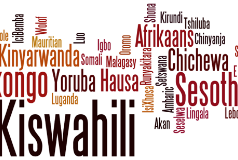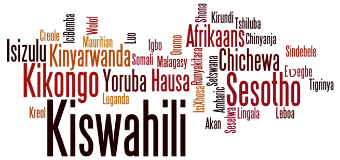African Languages are Key to African Renaissance
08/09/2014Even though European languages are widely spoken on the African continent, some Africans believe that the African people should return to their mother languages. This so-called “African Renaissance” will not only keep Africa’s native languages from extinction, but will also prevent a lot of knowledge from disappearing.

According to Apioth Mayom Apioth, ever since the 1884 “Scramble for Africa” in which a number of European countries divided the continent, Africa can be broken down into a Anglophone, Francophone, Italophone and Lusophone region.
In his article on the New Internationalist Blog, Apioth states that this division is often the cause of rivalries and influences economic matters. He believes that the use of foreign languages means African people will never live up to their actual potential. Even though African languages can enrich foreign ones by means of translation – take The Dark Child by Camara Laye, for example – Apioth asks himself whether Africa could have made a bigger impact on the Western world.
Apioth thinks that Africa needs to embrace its native languages in order to start an African Renaissance. After all, the Renaissance in Europe required the abandonment of Latin to really take off! Moreover, Apioth believes progress is deeply engrained in the African languages and that Africans have an almost spiritual attachment to their native languages. When Africans abandon their mother languages, he says, cultural knowledge about myths and fables, but also scientific knowledge about ecosystems, plants and animals is lost. Many African tribes know how to turn certain herbs into medicine, for example.
It has been predicted that hegemonic languages, i.e. languages that are not influenced by other languages that much, will become more and more important. According to Apioth, this means that many other, weaker languages will disappear. However, it is still unclear which languages will prevail. Thus, he says, shouldn’t Africans take measures to ensure their native languages survive?
Even though they have been changed by the European languages, Apioth believes the African languages are still viable. What they need, he says, is “the constant nourishment by the beloved sons and daughters of the continent.”
Africans should dust off their native languages so that when the much-discussed global village finally arises, the continent can contribute to it with its own, unique culture. Apioth thinks more effort and resources should be invested in Africa’s native languages, which he feels have certain sacred characteristics.
If Africa neglects its languages, the continent and its inhabitants won’t be able to help humankind; moreover, if it leads to any ingenuity at all, it will be a shabby kind of ingenuity if European languages are used.

